The Intel Comet Lake Core i9-10900K, i7-10700K, i5-10600K CPU Review: Skylake We Go Again
by Dr. Ian Cutress on May 20, 2020 9:00 AM EST- Posted in
- CPUs
- Intel
- Skylake
- 14nm
- Z490
- 10th Gen Core
- Comet Lake
CPU Performance: Web and Legacy Tests
While more the focus of low-end and small form factor systems, web-based benchmarks are notoriously difficult to standardize. Modern web browsers are frequently updated, with no recourse to disable those updates, and as such there is difficulty in keeping a common platform. The fast paced nature of browser development means that version numbers (and performance) can change from week to week. Despite this, web tests are often a good measure of user experience: a lot of what most office work is today revolves around web applications, particularly email and office apps, but also interfaces and development environments. Our web tests include some of the industry standard tests, as well as a few popular but older tests.
We have also included our legacy benchmarks in this section, representing a stack of older code for popular benchmarks.
All of our benchmark results can also be found in our benchmark engine, Bench.
Speedometer 2: JavaScript Frameworks
Our newest web test is Speedometer 2, which is a accrued test over a series of javascript frameworks to do three simple things: built a list, enable each item in the list, and remove the list. All the frameworks implement the same visual cues, but obviously apply them from different coding angles.
Our test goes through the list of frameworks, and produces a final score indicative of ‘rpm’, one of the benchmarks internal metrics. We report this final score.
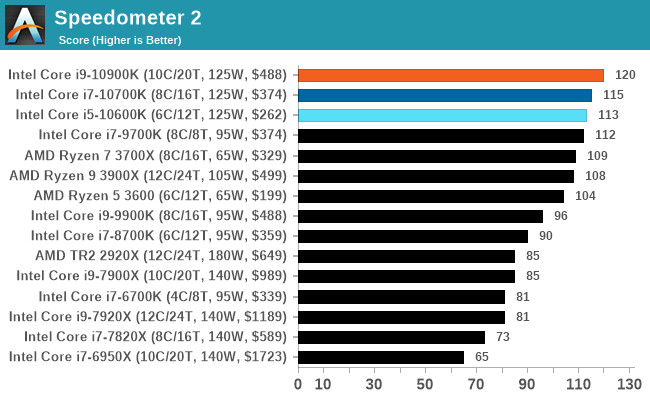
Google Octane 2.0: Core Web Compute
A popular web test for several years, but now no longer being updated, is Octane, developed by Google. Version 2.0 of the test performs the best part of two-dozen compute related tasks, such as regular expressions, cryptography, ray tracing, emulation, and Navier-Stokes physics calculations.
The test gives each sub-test a score and produces a geometric mean of the set as a final result. We run the full benchmark four times, and average the final results.
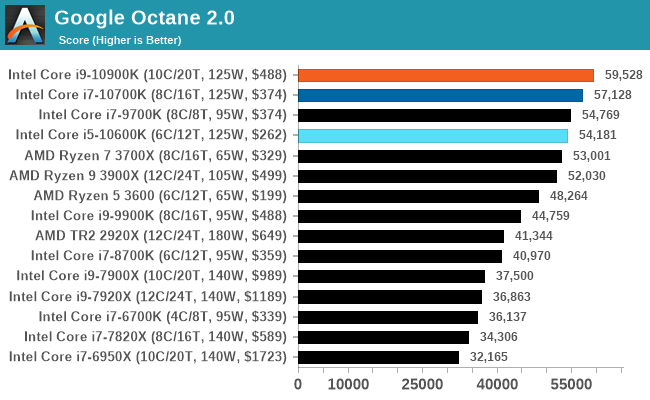
Mozilla Kraken 1.1: Core Web Compute
Even older than Octane is Kraken, this time developed by Mozilla. This is an older test that does similar computational mechanics, such as audio processing or image filtering. Kraken seems to produce a highly variable result depending on the browser version, as it is a test that is keenly optimized for.
The main benchmark runs through each of the sub-tests ten times and produces an average time to completion for each loop, given in milliseconds. We run the full benchmark four times and take an average of the time taken.
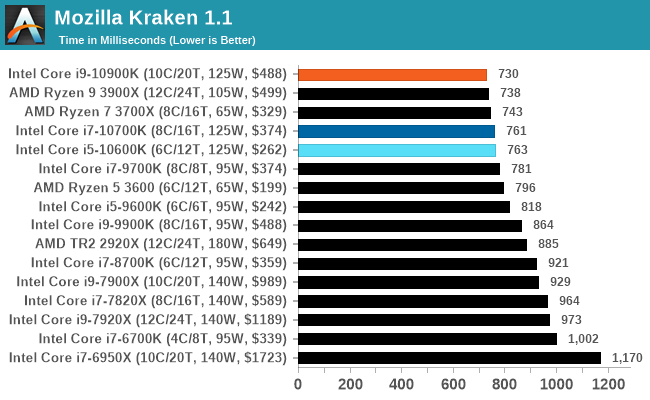
3DPM v1: Naïve Code Variant of 3DPM v2.1
The first legacy test in the suite is the first version of our 3DPM benchmark. This is the ultimate naïve version of the code, as if it was written by scientist with no knowledge of how computer hardware, compilers, or optimization works (which in fact, it was at the start). This represents a large body of scientific simulation out in the wild, where getting the answer is more important than it being fast (getting a result in 4 days is acceptable if it’s correct, rather than sending someone away for a year to learn to code and getting the result in 5 minutes).
In this version, the only real optimization was in the compiler flags (-O2, -fp:fast), compiling it in release mode, and enabling OpenMP in the main compute loops. The loops were not configured for function size, and one of the key slowdowns is false sharing in the cache. It also has long dependency chains based on the random number generation, which leads to relatively poor performance on specific compute microarchitectures.
3DPM v1 can be downloaded with our 3DPM v2 code here: 3DPMv2.1.rar (13.0 MB)
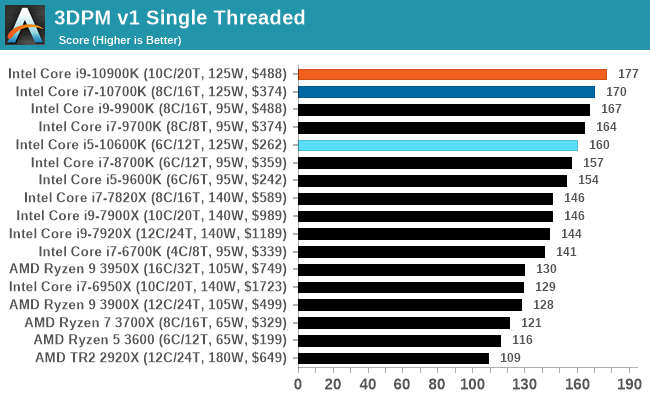
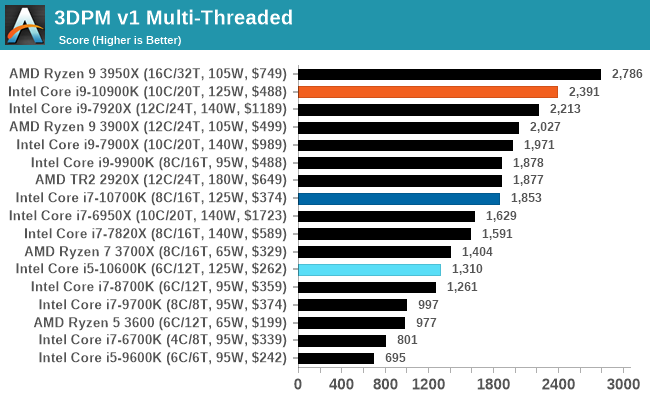
x264 HD 3.0: Older Transcode Test
This transcoding test is super old, and was used by Anand back in the day of Pentium 4 and Athlon II processors. Here a standardized 720p video is transcoded with a two-pass conversion, with the benchmark showing the frames-per-second of each pass. This benchmark is single-threaded, and between some micro-architectures we seem to actually hit an instructions-per-clock wall.
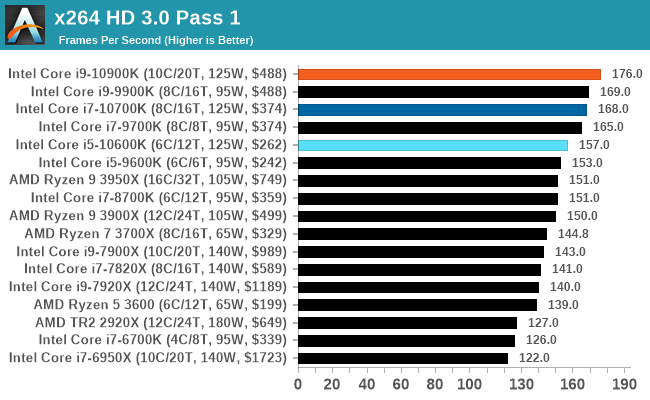
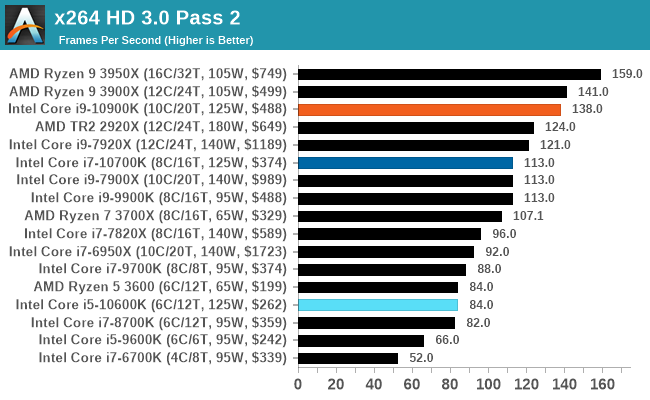










220 Comments
View All Comments
Boshum - Wednesday, May 20, 2020 - link
I generally agree, but I'm not so certain AMD will be in 2nd place within 5 years (from a best CPU architecture point of view). They should be considering the difference in resources, but Intel is so spread out and AMD seems so focused.poohbear - Wednesday, May 20, 2020 - link
OK i'll bite. Why would anyone buy this generation of Intel processors when AMD's is just as powerful and yet more efficient being on 7nm? Especially with Ryzen 4000 coming out this fall.dguy6789 - Wednesday, May 20, 2020 - link
AMD is ahead in a few key areas- price vs performance, total number of cores/threads, power.Intel is still ahead in the per core/per thread area. An Intel 8 core 16 thread will beat an AMD 8 core 16 thread in absolutely everything because of just how high Intel chips can clock to. In short, Intel is a higher performing albeit more expensive option for low thread count workloads.
Boshum - Wednesday, May 20, 2020 - link
I don't think the power and heat are too big a deal until you hit the 8 and 10-core K chips. The people that buy those are enthusiast gamers who want the highest possible FPS in games (whether they are able to perceive it or not, but I am sure they can in certain scenarios). A lot of those ultra-enthusiasts have a lot of fun with overclocking too, and Intel gets more out of that.Ryzen 4000 will undoubtedly be a better overall chip, but Rocket Lake should be coming to the LGA 1200 platform in the not too distant future. It may pass up Ryzen 4000 in gaming for those benchmark enthusiasts. It will be no match for Ryzen 4000 in heavy multi-core scenarios.
gagegfg - Wednesday, May 20, 2020 - link
At the end of the day, AMD continues to have the performance crown at a price premium (3950X).Also, it seems to me a bad ANANTECH policy for many graphics that do not have an AMD equivalent CPU and only put the 3600.
mandoman - Wednesday, May 20, 2020 - link
I can't imaging anyone being the slightest bit concerned about power on the HEDT! It's simply ludicrous to even bring it into the discussion. Frankly the whole emphasis in this review smacks loudly of "tree hugger" philosophy which has no place in the high end computing arena at all.Beany2013 - Wednesday, May 20, 2020 - link
Some of us actually care about good engineering rather than pushing an old, inefficient process node as hard as technically possible.Enjoy dropping an extra £100 just to cool your CPU.
Hxx - Wednesday, May 20, 2020 - link
WHAAT? U think this is not good engineering? this is BALLS engineering, they basically achieved a miracle on the 14nm platform. You are basically standing in front of a miracle. Step back and think about it. A 5 yo technology that competes and beats in many tests the competitor's 7nm process. Yes overall AMD may be the better purchase but again that not what im saying.Just think about that. On top of that they added good overclocking, controlled temps, plenty features, etc . Cant say im impressed with the Z490 platform itself since its the same old z390/70/270/170 with better connectivity but the CPU themselves will make history I mean the 14nm process sure is effing OLD but man what these guys did with this, the refinement it went through to achieve this performance on this OLD tech is amazing in my opinion and for that I applaud them. I want them to hurry up and wrap up Rocket Lake but this is definitely for sure no doubt definitely great engineering.
alufan - Thursday, May 21, 2020 - link
so what exactly do you think would happen if AMD did the same thing threw the power limits out the window and used a 14++++++ node with the extra thermal headroom available with the 3000 series chips, Intel has not released its new process node chips because they cant make them work AMD has and the limitations are simply due to the node size and physics, they have engineered a way round the issue Intel even now is talking about backporting designs it stinks, this is a "new" chip from Intel with more top end period AMD has released 3 nodes in 3 years and has a new version coming up in a few months with a rumored 20% uplift in IPC but lets wait and see, not to mention 5nm is designed and being sampled and 3nm is in design, that is EngineeringHxx - Thursday, May 21, 2020 - link
ROFL AMD? AMD struggles with getting a BIOS right let alone fine tuning a platform ? Nah they are too busy now supposedly giving us a beta bios for the 4xx series and that's a very scary thought given AMD's track record. In case you didn't know, AMD doesn't make their own chips. If tsmc moves to a different node then so will AMD, that's how it works. So yes I applaud TSMC for good engineering, AMD not so much.